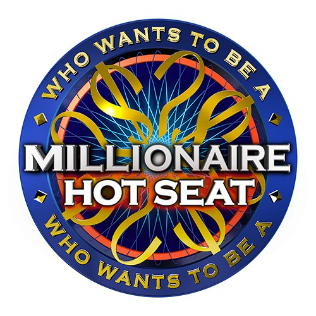Who Wants to Be a Millionaire? is an international television game show franchise of British origin, created by David Briggs, Mike Whitehill and Steven Knight. In its format, currently owned and licensed by Sony Pictures Television, contestants tackle a series of multiple-choice questions to win large cash prizes in a format that twists on many game show genre conventions – only one contestant plays at a time, similar to radio quizzes; contestants are given the question before deciding whether to answer, and have no time limit to answer questions; and the amount offered increases as they tackle questions that become increasingly difficult. The maximum cash prize offered in most versions of the format is an aspirational value in local currency, such as one million pounds in the UK or 75 million rupees in India.

Press Your Luck is an American television game show created by Bill Carruthers and Jan McCormack. Contestants answer trivia questions to earn "spins" on a randomly cycling game board whose spaces display cash, prizes, extra spins, special items, or the show's mascot, a cartoon creature known as the Whammy. Landing on a Whammy eliminates any cash and prizes accumulated while also displaying a short comedic animation. Its format is a revival of an earlier Carruthers production, Second Chance, which was hosted by Jim Peck and aired on ABC in 1977. The original version of Press Your Luck aired on CBS between 1983 and 1986. This version featured Peter Tomarken as host, Rod Roddy as announcer, and Carruthers as both director and voice of the Whammy.

Eye Guess was an American game show created by Bob Stewart and hosted by Bill Cullen, which aired on NBC from January 3, 1966, to September 26, 1969. The game combined a general knowledge quiz with a Concentration-style memory element, where the answers were shown to the players and their recall of their positions was tested.

Game Ka Na Ba?, formerly Pilipinas Game Ka Na Ba is a Philippine game show created by ABS-CBN. The main goal of the game is to win 2 million pesos by answering trivia questions.

Tic-Tac-Dough is an American television game show based on the paper-and-pencil game of tic-tac-toe. Contestants answer questions in various categories to put up their respective symbol, X or O, on the board. Three versions were produced: the initial 1956–59 run on NBC, a 1978–86 run initially on CBS and then in syndication, and a syndicated run in 1990. The show was produced by Barry & Enright Productions.

Deal or No Deal is an Australian game show that originally aired on the Seven Network from 13 July 2003 to 4 October 2013. It was the first international version of the game show, after the original Miljoenenjacht from the Netherlands. It was the first of the versions to use the Deal or No Deal name. It was hosted by Andrew O'Keefe for its initial 10-year run.

Who Wants to Be a Millionaire is an American television game show based on the format of the same-titled British program created by David Briggs, Steven Knight and Mike Whitehill and developed in the United States by Michael Davies. The show features a quiz competition with contestants attempting to win a top prize of $1,000,000 by answering a series of multiple-choice questions, usually of increasing difficulty. The program has endured as one of the longest-running and most successful international variants in the Who Wants to Be a Millionaire? franchise.
Wheel of Fortune is an Australian television game show produced by Grundy Television until 2006, and CBS Studios International in 2008. The program aired on the Seven Network from 1981 to 2004 and January to July 2006, aired at 5:00pm from 1981 to 1989 and from 2004 to 2006 and at 5:30pm from 1989 to 2003, and is mostly based on the same general format as the original American version of the program.

Deal or No Deal is an Arabic version of the franchise Deal or No Deal and was first broadcast on September 15, 2004, with a brief weekly run on the Pan-Arabic channel MBC 1, called Al Safqa (الصفقة) and hosted by Amir Karara. The top prize was $1,000,000, which has been the biggest prize to be won on any Middle Eastern game show at the time.

¡Allá tú! is the Spanish version of Deal or No Deal. It was initially broadcast by Telecinco between 2004 and 2008 and later changed to sister channel Cuatro for a comeback in 2011, before returning to Telecinco in 2023.
Power of 10 is an international Sony Pictures Television game show format featuring contestants predicting how a cross-section of local people from the host broadcaster's country responded to questions covering a wide variety of topics in polls conducted by the broadcaster and production company.

Don't Forget the Lyrics! is an American television game show in which contestants compete to win $1 million by correctly recalling song lyrics from a variety of genres. The program originally aired on Fox from July 11, 2007, to June 19, 2009, hosted by Wayne Brady and produced by RDF USA, part of RDF Media. The premiere of the show prompted NBC to move up the premiere of their similar game show, The Singing Bee.

Who Wants to Be a Millionaire? is an Australian television game show which would offer a maximum cash prize of $1,000,000 for answering 15 successive multiple-choice questions of increasing difficulty. The show was based on and follows the same general format of the original version of the show from the United Kingdom, and is part of the international Who Wants to Be a Millionaire? franchise.

10 Ka Dum is an Indian version of the international reality game show Power of 10, and aired on Sony Entertainment Television. The show was hosted by popular Bollywood actor Salman Khan. According to reports, the show helped Sony TV regain its third position in the Indian television ratings. A third season was announced in early 2018, which premiered on 4 June 2018, on the same network. The grand finale guest of the third season were Shahrukh Khan and Rani Mukherjee. The final episode also had a special entry of actor-comedian Sunil Grover in his characters of "Rinku Bhabhi" and "Amitabh Bachchan".

Who Wants to Be a Millionaire? New Zealand was a New Zealand game show based on the original British format of Who Wants to Be a Millionaire?. The show was hosted by Mike Hosking. The main goal of the game was to win one million New Zealand dollars by answering 15 multiple-choice questions correctly. There were four "lifelines". It was broadcast on the TVNZ station TV ONE. The show was taped in Melbourne, Australia on the set of the Australian version of the show.
Family Feud was an Australian game show based on the American show of the same name. The program ran on the Nine Network from 1978 to 1984, and on the Seven Network from 1990 to 1996. The program has been revived twice, in 2006 and 2014.

Millionaire Hot Seat, also known as Hot Seat, was an Australian television quiz show. The show was a spin-off of Who Wants to Be a Millionaire? and began airing on the Nine Network on 20 April 2009. As with the original Australian version of the show, it was hosted by Eddie McGuire and followed a similar format.

Tipping Point is a British quiz show that is broadcast on the ITV network, with repeats also on W and Really. First airing on 2 July 2012, the programme is presented by Ben Shephard and features three players answering questions on the subject of general knowledge to win counters which they use on a large coin pusher arcade-style machine. Only the winner at the end has a chance to take home any money; the others leave with nothing except any non-cash prizes they may have won during the game.

Million Dollar Minute is an Australian quiz show which aired on the Seven Network. It premiered on 16 September 2013. The show was originally hosted by Grant Denyer, and later by Simon Reeve, and aired at 5:30 pm on weeknights. The show was cancelled in September 2015 and was replaced by The Chase Australia in its timeslot. Repeats are currently shown on 7TWO in place of Home and Away's Early Years on Hiatus.
L'eredità is an Italian Rai 1 game show currently hosted by Marco Liorni. It premiered on 29 July 2002. From 29 July 2002 to 10 June 2006, it was hosted by Italian presenter Amadeus. He was succeeded by Carlo Conti, who hosted the show until 14 April 2014, when he was replaced by Fabrizio Frizzi. Frizzi hosted until 23 October 2017, when he became ill during the taping of the next show and was taken to the hospital. Carlo Conti substituted for Frizzi from 30 October 2017 to 15 December 2017, and he hosted the special episode in tandem with Fabrizio Frizzi when the latter returned to host the quiz. On 16 December 2017, Fabrizio Frizzi resumed hosting the show by himself until 25 March 2018. The next day, Frizzi died of a brain haemorrhage. Following a hiatus due to Frizzi's death, the game returned from 3 April 2018 until the end of the season with the host Carlo Conti. Flavio Insinna presented the show from 24 September 2018 until 2023.














